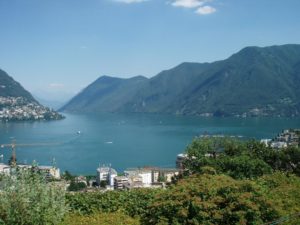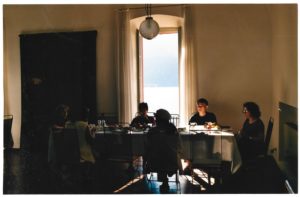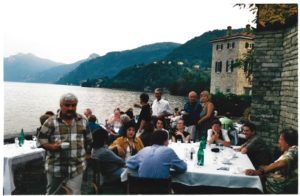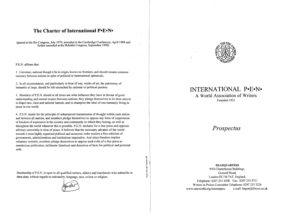Posts Tagged ‘Bellagio’
PEN Journey 28: Bellagio: Looking Forward—PEN for the 21st Century
PEN International celebrates its Centenary in 2021. I’ve been active in PEN for more than 30 years in various positions and now as an International Vice President Emeritus. With memories stirring and file drawers of documents and correspondence bulging, I am a bit of a walking archive and have been asked by PEN International to write down memories. I hope this personal PEN journey will be of interest.
In discovering Lake Como in Northern Italy on a walking tour in 1790 poet William Wordsworth called it “a treasure, which the Earth keeps to itself.” Poet Percy Bysshe Shelley declared it “exceeds anything I ever beheld in beauty with the exception of the arbutus islands of Killarney.” He extolled the chestnut, laurel, bay, myrtle, fig and olive trees that “over-hang the caverns and shadow the deep glens which are filled with the flashing light of the waterfalls.” These descriptions from the English romantic poets are matched no doubt by Italian and other poets encountering Lake Como, one of Italy’s largest and one of Europe’s deepest lakes.

Lake Como—“a treasure which the Earth keeps to itself” and the site of PEN International’s strategic planning conference, July 2003
Lake Como is one of my favorite places so meeting for an International PEN strategic planning conference above the shimmering Y-shaped lake set among the Alpine foothills was an ideal working vacation the summer of 2003. I participated as a PEN vice president and a trustee of the International PEN Foundation and former Writers in Prison Committee chair, along with International PEN’s President Homero Aridjis, International Secretary Terry Carlbom, Treasurer Britta Junge Pedersen, current and past board members, other trustees of the International PEN Foundation, several vice presidents and the standing committee chairs.
Twenty-six of us from 14 countries gathered to discuss the changed global context for PEN, which had grown from 95 to 134 centers in the last 14 years, and to consider the demands on this organization dedicated to the role of writers in promoting intellectual co-operation, tolerance and pluralism in the world.

Working session of PEN International’s planning conference, 2003 (photo courtesy Carles Torner)
There had been significant growth in the activities and programs carried out by PEN centers and by the international office. In 1991 a Women Writers Committee had been founded. In 1992 an associated charity, the International PEN Foundation was created, and now British charitable law had changed so a charitable corporation would replace it. In 1998 following the revision of the Regulations, a nine-member Board came into existence, and in 1999 the Writers in Exile Network was formed. All of this had occurred in a rapidly changing globe, placing strain on PEN’s membership and structures.
With the help of American PEN and PEN USA West, International PEN had received funding for the large strategic planning initiative from the Andrew W. Mellon Foundation and the Sulzberger Foundation and a grant for the four-day residency at the Rockefeller Foundation’s Bellagio Study and Conference Center. Edmund (Mike) Keeley, former American PEN president, Eric Lax, former PEN USA West President, and Michael Roberts, American PEN’s executive director, had been instrumental in getting the grants, and Mike Roberts, a lawyer, served as pro bono counsel for International PEN in the process. George Gawlinski, director of Planning Together Associates who had worked with PEN before, facilitated the discussions.
The Rockefeller Foundation’s Villa Serbelloni spread out above the village of Bellagio, which climbed the hills with cobbled streets and terraced gardens and sat on a promontory at the intersection of the fingers of the lake. Water was visible on all sides.

Delegates taking a break at PEN International’s strategic planning conference at the Rockefeller Foundation’s Study and Conference center in Bellagio, Italy, 2003 (photo courtesy Carles Torner)
All of us knew each other, had worked together over many years and knew PEN International. A smaller group had already met twice in London for preliminary planning. The goal of the Bellagio meeting was to re-examine major areas of PEN’s life, including governing structures, scope of its programs, the role and structure of the Secretariat and plans for fundraising. The hope of the conference was that we would reach an interim consensus that could then be circulated to the PEN centers for comment so that a final plan could be approved at the fall 2003 World Congress in Mexico City.
We debated and discussed programs and structures in workshops and at meals and in winding walks over the hills. It was difficult at times to parse through strategic aims, governance, center development, capacity building and financial models while looking out on the expanse of blue sky and water with poetry and history fleeting in and out of thought, but we managed to take on each issue, share ideas and finally agree on a document and recommendations.

PEN members at strategic planning conference on Lake Como, 2003. L to R: Eugene Schoulgin (WiPC Chair/Norwegian PEN), Judith Rodriguez (PEN Board/Melbourne PEN), Moris Farhi (Vice President/former WiPC chair/English PEN), Eugene Schoulgin, Hori Takeaki (PEN Board/Japan PEN), Alexander (Sascha) Tkachenko (PEN Board/Russian PEN), Terry Carlbom (International Secretary/Swedish PEN) (photos courtesy Carles Torner)
One immediate discussion in the wings and at informal meetings during the conference was who would be the next President of International PEN. Homero Aridjis’ second term concluded at the Mexico Congress. The PEN centers and Search Committee had yet to nominate a candidate. Central to the formal and informal discussions was the role of the President and the International Secretary—both volunteer positions. Was it not time for International PEN to hire a professional paid executive director to manage the organization? If PEN decided to embrace that course, was there still a need for both a President and an International Secretary? These roles had changed over the years, in part depending on who occupied them. During the 17-year tenure of the immediate past International Secretary, the position had essentially been an executive position with a budget for travel but not a salary. PEN, however, had recently imposed limits of two 3-year terms for both the offices of the President and International Secretary. In 2003 the International Secretary did not have a vote on the Board, but that would change.
The 2003 deliberations, before an executive director was added, concluded that there was still a need for both positions, especially if PEN chose as its President a world renowned writer who was not able to attend to the running of PEN but one who served as a voice for PEN with governments and at events.
At the Bellagio conference there were several unofficial conversations about who might be the next president. In my files I found a list of 33 writers discussed. None was the name finally nominated and elected that fall in Mexico City, but the ultimate candidate was a close colleague of one of those eminent PEN members on the list, and that center endorsed the candidacy.
PEN Journey 29 will focus on the Mexico Congress, introduce the new president and outline the results of the long range strategic plan agreed by International PEN’s Assembly of Delegates as the organization embraced the 21st century.

PEN brochure draft with note for potential change in Charter to include “gender.” This change came in later years.
Next Installment: PEN Journey 29: Mexico City and the Road Ahead—Part I, Form